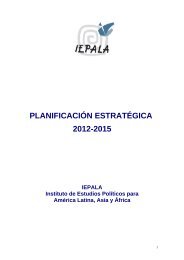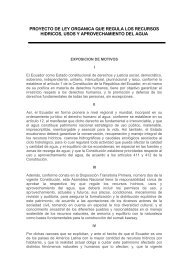<strong>Decentralization</strong> <strong>in</strong> <strong>Sierra</strong> <strong>Leone</strong>4. F<strong>in</strong>d<strong>in</strong>gs from Focus Group DiscussionsSummary F<strong>in</strong>d<strong>in</strong>gs from Focus Group DiscussionsPerceived Insufficiencies <strong>in</strong> Public ServicesFGD participants were appreciative of recent improvements <strong>in</strong> local services broughtabout by decentralization. But they also emphasized that these services rema<strong>in</strong><strong>in</strong>sufficient to satisfy local needs and claimed that they are often subject tomismanagement. A common compla<strong>in</strong>t was that poor people often have to pay <strong>for</strong>services that are supposed to be free (e.g. primary education) and that many amenitiesare either <strong>in</strong>complete (e.g. no furniture <strong>in</strong> new schools) or prone to resource shortages(e.g.no drugs <strong>in</strong> PHUs).There rema<strong>in</strong> many remote communities <strong>in</strong> rural <strong>Sierra</strong> <strong>Leone</strong> whose access to publicservices of any k<strong>in</strong>d is m<strong>in</strong>imal.Self-Help and PatronageMany services and amenities are organized locally on a self-help basis, especiallyeducation.There is an entrenched assumption <strong>in</strong> rural areas that welfare and services are as likelyto come from benevolent patrons as from public <strong>in</strong>stitutions.Criticisms of Local Councillors Because the resources local councils currently deliver are <strong>in</strong>sufficient to satisfyperceived needs, and because local councillors do not have the means to operate aspatrons, FGD participants’ views on councillors tend to be negative.The Political Geography of Chiefta<strong>in</strong>cy Local views on chiefs tend to vary accord<strong>in</strong>g to livelihood and geographical location.Remote rural communities rely on chiefs <strong>for</strong> social protection and <strong>for</strong> authorization ofproperty rights. Consequently, they tend to be strong supporters of the status quowhere chiefs’ powers and responsibilities are concerned. Smallholder farmers alsolook to chiefs <strong>for</strong> governance <strong>in</strong> peri-urban sett<strong>in</strong>gs although better educated wageworkers tend to put more trust <strong>in</strong> local councils. Deference towards chiefta<strong>in</strong>cydecl<strong>in</strong>es sharply <strong>in</strong> urban areas where economic opportunities are greater and sel<strong>for</strong>ganizedassociational life stronger. Kono District represents an exception to this pattern due to the wealth and decisionmak<strong>in</strong>gpower chiefs accumulated dur<strong>in</strong>g the peak years of diamond m<strong>in</strong><strong>in</strong>g.Support <strong>for</strong> <strong>Decentralization</strong> <strong>in</strong> Pr<strong>in</strong>cipleIn spite of the criticisms levelled at local councillors, FGD participants were verymuch <strong>in</strong> favour of decentralization <strong>in</strong> pr<strong>in</strong>ciple. In their view, the ma<strong>in</strong> benefit ofdecentralization is that it makes government aware of local needs and “gives voice tothe voiceless.”Even <strong>in</strong> Kono District, local councils rather than chiefs were FGD participants’preferred agencies <strong>for</strong> deliver<strong>in</strong>g services. A fear expressed <strong>in</strong> Kono was that withoutlocal councils, taxes, market dues and shop licences will <strong>in</strong>crease.4.1 Perceived Insufficiencies <strong>in</strong> Public ServicesFGD participants <strong>in</strong> all districts were appreciative of recent improvements <strong>in</strong> local servicesbrought about by decentralization. But they also emphasized that these services rema<strong>in</strong><strong>in</strong>sufficient to satisfy local needs and claimed that they are often subject to mismanagement.Fanthorpe Consultancy Ltd Page 25
<strong>Decentralization</strong> <strong>in</strong> <strong>Sierra</strong> <strong>Leone</strong>For example, a youth leader and the secretary of a WDC almost came to blows dur<strong>in</strong>g oneFGD <strong>in</strong> Bo District when the <strong>for</strong>mer, compla<strong>in</strong><strong>in</strong>g that people pay local tax but never seeanyth<strong>in</strong>g <strong>in</strong> return, alleged that that public funds are be<strong>in</strong>g depleted by corruption. By way ofexample, the youth leader po<strong>in</strong>ted out that government was supposed to subsidiz<strong>in</strong>g primaryeducation. If that was the case, why was the local primary school still demand<strong>in</strong>g fees fromparents? The likely explanation, the youth leader went on, was that the subsidy was be<strong>in</strong>gdiverted <strong>in</strong>to private pockets be<strong>for</strong>e it reached the school. He offended the WDC secretary bynam<strong>in</strong>g the paramount chief and local councillor as r<strong>in</strong>gleaders <strong>in</strong> this alleged corruption.Similar suspicions were voiced <strong>in</strong> other FGDs <strong>in</strong> Bo District. For example, <strong>in</strong> one area not alllocal ABOs are benefitt<strong>in</strong>g from council seed rice distributions. This omission led anunsuccessful contestant <strong>for</strong> the SLPP nom<strong>in</strong>ation <strong>in</strong> the last local government elections toaccuse the sitt<strong>in</strong>g councillor of sell<strong>in</strong>g off some of the rice. Another claim voiced <strong>in</strong> Bo FGDswas that local councils favour certa<strong>in</strong> contractors because they get kickbacks from them, andconsequently refuse to acknowledge compla<strong>in</strong>ts if the work is substandard. MDA staff weresimilarly accused of favour<strong>in</strong>g certa<strong>in</strong> contractors, and it was also claimed that local councilChief Adm<strong>in</strong>istrators receive orders from Freetown to favour particular contractors.However, a further po<strong>in</strong>t raised <strong>in</strong> these FGDs was that public suspicion towardsgovernmental authorities has become habitual and may be fuelled by misunderstand<strong>in</strong>gs asmuch as demonstrable wrongdo<strong>in</strong>g. For example, it was po<strong>in</strong>ted out that when a contractorbuilds a school classroom but does not supply any furniture, it might mean that furniture wasnot <strong>in</strong>cluded <strong>in</strong> the contract. But local people might still assume that councillors and teachershad sold off the miss<strong>in</strong>g furniture <strong>for</strong> private ga<strong>in</strong> be<strong>for</strong>e it reached the school.The most frequent comment on local services <strong>in</strong> all of the FGDs was that there were simplynot enough of them. In Makeni <strong>for</strong> example, FGD participants reported that the governmenthospital rarely has sufficient supplies of drugs and people have to pay <strong>for</strong> them out of theirown pockets. Primary education is supposed to be free but it was claimed that people arepay<strong>in</strong>g between 6,000 and 10,000 <strong>Leone</strong>s per year <strong>in</strong> supplementary fees. Participantsacknowledged that education is underfunded and needs support, but also po<strong>in</strong>ted out thatteachers who are not paid by government tend to lack motivation. One youth reported that alesson scheduled <strong>for</strong> an hour may only last <strong>for</strong> 40 m<strong>in</strong>utes and parents who don’t pay extra<strong>for</strong> stationary and text books may f<strong>in</strong>d their children refused entry to exams. Participants alsoemphasised that some services are beyond the f<strong>in</strong>ancial reach of ord<strong>in</strong>ary people. Farmersmay have been <strong>in</strong>vited by government to <strong>for</strong>m ABOs and pool resources to lease-hiretractors, but poor villagers cannot af<strong>for</strong>d them. One ABO <strong>in</strong> the Makeni area reportedly rentsout its mach<strong>in</strong>e <strong>for</strong> 80,000 <strong>Leone</strong>s per hour.In Kono, the city council was praised <strong>for</strong> build<strong>in</strong>g a new junior secondary school, and thelocal councils’ school scholarship scheme was also spoken of approv<strong>in</strong>gly. Seed distributionsto ABOs also received a favourable mention and a women’s group reserved special praise <strong>for</strong>the recently <strong>in</strong>troduced free health care scheme <strong>for</strong> pregnant and nurs<strong>in</strong>g women and childrenunder five. But aga<strong>in</strong>, FGD participants emphasized that the benefits of decentralization areovershadowed by problems that have yet to addressed, e.g. overcrowded and under-resourcedschools and the fact that PHUs <strong>in</strong> remote areas often run out of drugs and equipment.A woman’s farm<strong>in</strong>g cooperative <strong>in</strong> WARD also spoke approv<strong>in</strong>gly of free health care <strong>for</strong>nurs<strong>in</strong>g mothers and small children and praised the local council’s work <strong>in</strong> build<strong>in</strong>g schoolsand PHUs. WARD was the only survey district <strong>in</strong> which it was mentioned that CBOs areFanthorpe Consultancy Ltd Page 26
















